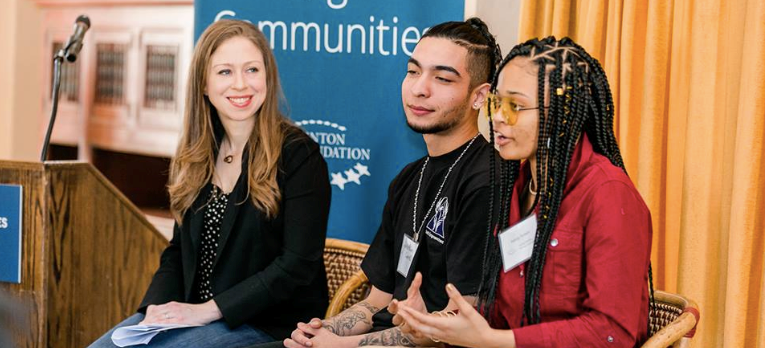Speaking in front of dozens of San Diego leaders, advocates and community members, Jonathan Curiel shared his experiences within the juvenile justice system and the challenges he faces moving forward.
“Being on probation since I was twelve, I’ve always had people tell me what I can’t do,” explained Johnathan. “But recently, my new probation offer has provided me a new level of support and trust that I’ve never experienced. Instead of only focusing on my problems and talking at me, she listens to me and takes the time to understand my personal situation. I finally feel like I have a partner who is there to support me on my path.”
Johnathan was speaking as a youth advocate alongside Chelsea Clinton at The San Diego Foundation Strong Families, Thriving Communities Convening in February.
The event brought together key stakeholders, such as County Supervisor Nathan Fletcher and Nick Macchione, Director of the County of San Diego Health and Human Services Agency, to strengthen dialogue around the importance of improving health outcomes and reducing disproportionality for families and children involved in the child welfare and juvenile justice systems.
Establishing a Code of Conduct
Since 2017, as part of the Strong Families, Thriving Communities Program, The San Diego Foundation, Clinton Foundation and the County of San Diego have engaged more than 100 community partners and organizations in a process to align child welfare and juvenile justice policies, practices and resources to increase equity and effectiveness for communities, families and children.
Through the multi-year process, the Strong Families, Thriving Communities Coalition has been able to identify and pursue solutions that reframe how we support impacted children, youth and families.
February’s event with Chelsea Clinton shined a brighter light on the collaborative steps San Diego leaders are taking to address regional challenges.
For example, working directly with dozens of youth from Project A.W.A.R.E., Just in Time for Foster Youth, and Youth Empowerment who have lived experience in child welfare and juvenile justice systems, the coalition created a new Trauma-Informed Code of Conduct to provide government agencies, nonprofit organizations and communities with a framework on how to support youth in building resilience, and in being balanced, healthy and empowered. Organizations that adopt the Code of Conduct commit to ensuring policies and staff practices meet certain standards, and a system of accountability.
By adopting the Code of Conduct, organizations agree to uphold four key principles:
- Safety – A Safe and open-minded place where I feel welcome
- Supportive Staff – Is kind and has a true and genuine passion for helping me
- Effective Communication – Providing me with clear and consistent information
- Individualized Support – Assists me and considers the factors affecting my situation
Children and families in child welfare and juvenile justice systems often face challenges, including poverty, substance abuse and other forms of trauma.
According to the National Alliance on Mental Illness, 70 percent of children in the juvenile justice system have at least one diagnosable behavioral health disorder. And foster children often experience post-traumatic stress disorder at rates comparable to U.S. war veterans.
The Code of Conduct will create an environment that allows each individual to address their unique challenges in a productive way and get back on a pathway toward success with the support of their community.
Helping San Diego Families Thrive
The Trauma-Informed Code of Conduct is one example of the ongoing efforts by the Strong Families, Thriving Communities coalition to increase equity and effectiveness for children, families and communities.
As Connie Matsui, Interim President & CEO of The San Diego Foundation shared during the event, “The solutions we pursue together as a coalition will create pathways for our children to succeed and our region to thrive. By addressing systemic gaps that exist in our region, we will increase the number of children and families who are getting all the help that they need.”
By working together with regional partners, local agencies and philanthropists, we’re creating a roadmap to improve systems that effect enduring change so all children and families in San Diego County are healthy, live well and thrive.


